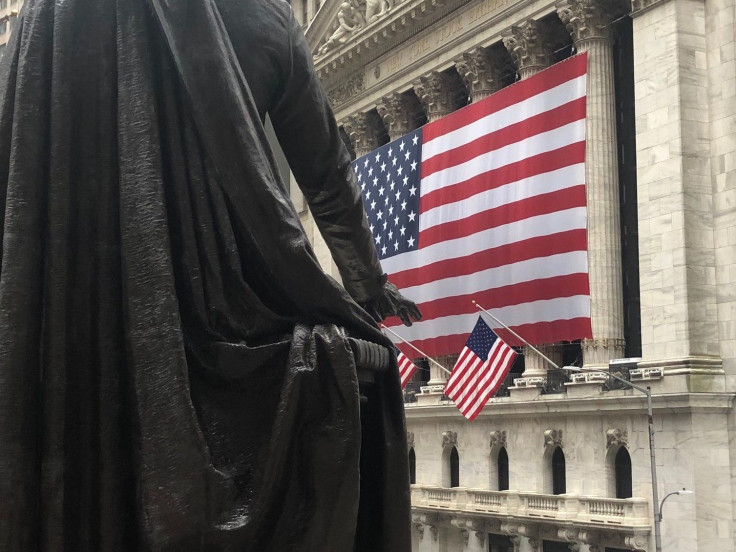Monday’s Stock Market Close: US Equities Climb Despite Covid-19 Spike, Dow Boosted By Boeing

KEY POINTS
- Boeing jumped more than 14% after certification flights for its 737 Max aircraft began
- Pending home sales surged by 44.3% in May compared to April
- Florida, Arizona, California, Nevada and Texas reported spike in covid-19 cases
U.S. stocks gained on Monday as traders shrugged off reports that cases of covid-19 continue to surge in the U.S., raising worries about a delayed economic recovery. Strength in Boeing (BA) helped pump up the Dow.
The Dow Jones Industrial Average jumped 580.25 points to 25,595.80, while the S&P 500 rose 44.19 points to 3,053.24 and the Nasdaq Composite Index climbed 116.93 points to 9,8745.15.
Monday’s volume on the New York Stock Exchange totaled 3.63 billion shares with 2,153 issues advancing, 45 setting new highs, and 856 declining, with two stocks setting new lows .
Active movers were led by Workhorse Group Inc. (WKHS), American Airlines (AAL) and Boeing (BA).
The Dow was boosted by Boeing which jumped more than 14% after certification flights for its 737 Max aircraft began on Monday.
The National Association of Realtors said on Monday that pending home sales surged by 44.3% in May compared to April, the largest one-month increase in the history of its survey. Still, sales were 5.1% below May 2019 levels.
“This has been a spectacular recovery for contract signings and goes to show the resiliency of American consumers and their evergreen desire for homeownership,” said Lawrence Yun, NAR’s chief economist. “This bounce-back also speaks to how the housing sector could lead the way for a broader economic recovery. Still, more home construction is needed to counter the persistent underproduction of homes over the past decade.”
The U.S. now has at least 2.5 million cases of covid-19, with Florida, Arizona, California, Nevada and Texas showing big jumps over the weekend. Florida has prohibited drinking in bars, while Texas scaled back business reopenings.
“There are more cases. There are more hospitalizations in some of those places and soon you’ll be seeing more deaths,” said White House health adviser Dr. Anthony Fauci. “Even though the deaths are coming down as a country, that doesn’t mean that you’re not going to start seeing them coming up now.”
“U.S. coronavirus statistics worsened over the weekend ... but traders ultimately faded this negativity yet again,” said Erik Bregar, head of FX strategy at the Exchange Bank of Canada.
“While there were many alarming COVID-19 ‘headlines’ over the weekend, noting ‘record case’ numbers, daily U.S. deaths attributed to COVID-19 fell to a new low,” said Tom Lee, managing partner and the head of research at Fundstrat Global Advisors.
“Reopening plans stumbled – this not only in new virus hotspots like [Texas] and [Florida], but also impacting international travel – as daily U.S. virus cases surpassed what all had hoped would be their peak in April,” wrote Julian Emanuel, chief equity and derivatives strategist at BTIG.
“The recovery is going to be much slower and much more uneven than most people believe,” cautioned David Hunt, president and chief executive officer of PGIM Inc. “Markets are priced for a much sharper V-shaped recovery, which we don’t think is likely.”
Overnight in Asia markets slid, as China’s Shanghai Composite index slipped 0.61%, Hong Kong’s Hang Seng exchange fell 1% and Japan’s Nikkei-225 dropped 2.3%.
In Europe markets finished higher, as Britain’s FTSE-100 rose 1.08%, while France’s CAC-40 climbed 0.73% and Germany’s DAX gained 1.18%.
Crude oil futures rose 2.55% at $39.47 per barrel, Brent crude slipped 0.53% at $41.63. Gold futures edged up 0.15%.
The euro rose 0.14% at $1.1237 while the pound sterling slipped 0.35% at $1.2293.
The yield on the 10-year Treasury edged up 0.31% to 0.638% while yield on the 30-year Treasury rose 1.31% to 1.39%.
© Copyright IBTimes 2025. All rights reserved.





















